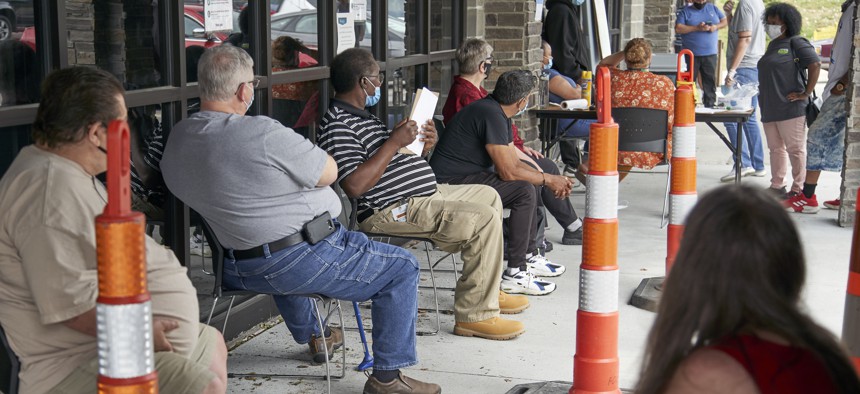How the End of the Federal Unemployment Boost Will Hurt the Economy

Job seekers exercise social distancing as they wait to be called into the Heartland Workforce Solutions office in Omaha, Neb., Wednesday, July 15, 2020. AP Photo/Nati Harnik

Connecting state and local government leaders
The $600-a-week federal boost in unemployment benefits is set to stop at the end of this month, leaving millions of people to live on substantially less money. Economists say the effects will also be felt throughout the U.S. economy.
More than 32 million Americans are currently receiving some form of unemployment benefits, but by the end of the month their weekly payouts will drop precipitously even as the coronavirus pandemic shows no sign of slowing down.
The $600-a-week boost in benefits authorized by the CARES Act will expire at the end of July without action from Congress and without it, experts said the economic recession will likely worsen.
The effects will be twofold. First, people who remain out of work will have less money to pay their rent or mortgage and buy basic necessities. Second, if the unemployed have less money, their spending will drop, which means local businesses already hit by the pandemic could see revenues decrease further.
Those receiving unemployment will see a large decrease in benefits once the $600 a week payments end—the nationwide average for weekly benefits in April was $333 but ranged from a low of $101 in Oklahoma to $531 in Massachusetts. For most states, the last enhanced payments will go out July 26.
Because of the increased unemployment benefits, stimulus checks and other aid programs meant to help people weather the economic downturn brought on by the coronavirus pandemic, people so far have largely still had money to spend and cover expenses, said Andrew Stettner, a senior fellow and expert on unemployment insurance at The Century Foundation. The discontinuation of the unemployment expansion “is going to have a big impact,” he said.
“It will be one of the real markers, as well as the PPP loans running out, where the recession really starts to hurt,” Stettner said.
About 10 million people in the United States are classified as very low-income households that spend at least half of their income on rent, said Diane Yentel, the president of the National Low Income Housing Coalition. If unemployed, they are particularly vulnerable to losing their housing.
“When you have such limited income to begin with and pay so much toward your home, you are always one financial emergency away from not being able to pay rent,” she said. “On August 1, if the unemployment insurance runs out, there will be millions of renters who can’t make rent.”
A recent report by the Urban Institute estimates that elements of the federal pandemic response plan—including the $600-a-week unemployment payments, direct stimulus check, and expansion of food stamp benefits—will keep 10 million people out of poverty this year.
“Families may find their finances strained later this year after the supplemental UI benefits end in August unless they can conserve money now to spend later—a challenge for families already having trouble making ends meet,” the report states.
In Washington, political disagreement leaves any agreement over an extension of the expanded benefits uncertain. Democrats have proposed a plan to keep the $600-a-week federal benefits in place but reduce the amount of the weekly payments incrementally as jobless rates in individual states fall below 11%.
Officials in the White House have indicated they are open to negotiations over a narrow extension of the benefits. The Senate is back in session next week, but it is unlikely any agreement on the next financial aid package will happen before the federal unemployment benefits expire.
Some Republicans are opposed to continuing the federal benefit boost, arguing if people make more money from unemployment than a job they will be disincentivized to return to work.
The National Bureau of Economic Research found that unemployment benefits exceed lost wages for about two-thirds of unemployed workers who are eligible for the federal payments. About one in five unemployed workers will receive benefits at least twice as large as their lost earnings.
But with unemployment high and a lack of jobs for workers to return to because of continued business closures, a cut to the federal benefits will likely harm the economy, experts said.
“I think it will depress spending markedly and probably lead to increases in foreclosure, delinquency and similar things with negative consequences for the economy,” said Joseph Vavra, one of the authors of the NBER report.
New research from the JPMorgan Chase Institute also supports that theory. Researchers there compared the spending of households that received federal unemployment benefits with those who did not.
In April, spending by unemployment recipients fell by 22% while spending for employed households declined by 15%. In the weeks after a person began receiving unemployment benefits, their spending rose about 10% above pre-pandemic spending levels while spending by people who remained employed rose to only about 10% below their pre-pandemic spending levels.
“The fact that spending by benefit recipients rose during the pandemic instead of falling, like in normal times, suggests that the $600 supplement has helped households to smooth consumption and stabilized aggregate demand,” the JPMorgan Chase report states. “Our estimates suggest that expiration will result in large spending cuts, with potentially negative effects on both households and macroeconomic activity.”
Andrea Noble is a staff correspondent with Route Fifty.

NEXT STORY: With Kids Spending More Waking Hours On Screens Than Ever, Here’s What Parents Need to Worry About




